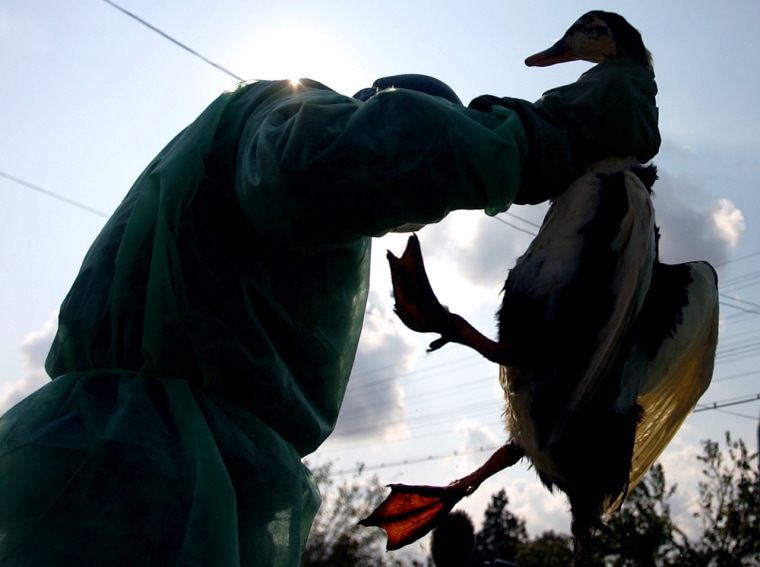Romania's Agriculture Ministry said Saturday that British lab tests had confirmed the H5N1 strain of bird flu had been found in Romania.
Agriculture Ministry spokesman Adrian Tibu said agriculture and veterinary officials were holding an emergency meeting Saturday morning with Interior Ministry officials and local leader to decide how to respond to the outbreak.
H5N1 is a particular type of bird flu that has struck parts of Asia, Russia and Turkey and is seen as a candidate to cause a flu pandemic if it mutates into a form capable of spreading easily from person to person.
Because people have not developed immunity to H5N1, unlike the usual strains of human flu, it could have more severe effects on a greater number of people. However, it is also possible that the mutation could create a relatively mild human flu.
EU announces combat measures
On Friday, the European Commission announced measures to combat the spread of bird flu, telling governments to pinpoint the areas most at risk and to keep poultry separate from wild birds, which carry the virus.
The Commission was acting on the advice of EU health and veterinary experts, who held an emergency meeting after confirmation that the deadly H5N1 strain had reached western Turkey.
Turkish medical staff on Friday tested nine people from the western town of Turgutlu for possible bird flu after 40 pigeons died, state-run Anatolian news agency said.
No sign of illness had been detected but they remained in hospital for observation, the agency quoted local health official Osman Ozturk as saying.
Europe’s multi-billion-euro poultry industry is braced for heavy losses should bird flu take hold, hitting export markets and dampening consumer demand.
“We’ve noticed a drop in poultry consumption of 10 percent since the beginning of October compared to last year,” said a spokeswoman for the poultry wholesalers’ union in Paris. “We believe that the main reason is bird flu.”
'A call to arms'
The World Health Organization said the spread of the virus to Europe’s fringes had increased the chances of human cases.
“It represents a call to arms on human health,” Mike Ryan, director of WHO’s alert and response operations, told Reuters. ”It’s not a time for panic, it is a time for action.”
Also on Friday, researchers said the virus was showing signs it can evade the drug considered the first line of defense against bird flu.
They found so-called resistant strains in a Vietnamese girl who recovered from a bird flu infection after being treated with Tamiflu. They also found evidence she was directly infected by her brother and not by chickens, a rare case of human-to-human transmission of the virus.
The finding illustrates the need to find and use other drugs to treat influenza and to work quickly to develop a vaccine, the researchers said.
“I don’t think we need to panic based on this finding,” Yoshihiro Kawaoka of the University of Wisconsin-Madison, who led the study, said in a telephone interview.
The report, to be published in the journal Nature next week, is bad news for doctors who already have precious little in the arsenal against bird flu should it become a human disease.
No human cases of the disease have been reported in Europe and the major threat of a human pandemic is still in Asia, experts believe. Bird flu has killed at least 65 people in Asia since 2003.
Farmers told to keep poultry indoors
The EU Commission said in its statement that European farmers might have to keep poultry indoors in high-risk areas such as wetlands and other areas frequented by migratory birds, the main carriers of the virus.
The Commission said it was watching developments closely in Turkey, Bulgaria, and in Romania.
A team of EU medical and laboratory experts will visit Turkey and Bulgaria from Monday to Thursday next week, and three other experts will visit Romania.
Thai Prime Minister Thaksin Shinawatra said his country — where 12 people have died of bird flu — could serve as a regional bird flu vaccine center to save every country having to build up its own stockpiles.
“If we would form a networking of stock, and we can borrow each other’s if things are happening some place, that might be a better way out instead of every country trying to have their own stockpile,” Thaksin said on a visit to Finland.
U.S. Health Secretary Mike Leavitt, who is visiting bird flu-hit countries in Southeast Asia, said in Hanoi: “H5N1 is mostly an animal disease today. To stop it from spreading to humans, we have to stop it in birds.”
Safe to eat chicken?
To calm the public, the Turkish and French prime ministers made a point of eating chicken.
“Every necessary precaution has been taken from the very first moment both in the place where the illness was first detected and against the possibility that it could spread,” Erdogan told reporters in Ankara.
The threat has caused consternation in Europe even though people there do not live in close contact with poultry at their homes, as in Asia. One Asian victim consumed raw duck’s blood, a delicacy not popular in Europe.
The WHO says “the main route of human infection” from birds is direct contact with infected poultry, or surfaces and objects contaminated by their droppings.
But experts say if H5N1 mutates and becomes able to spread easily from person to person, it could make more than 25 million people seriously ill and kill as many as 7 million.
